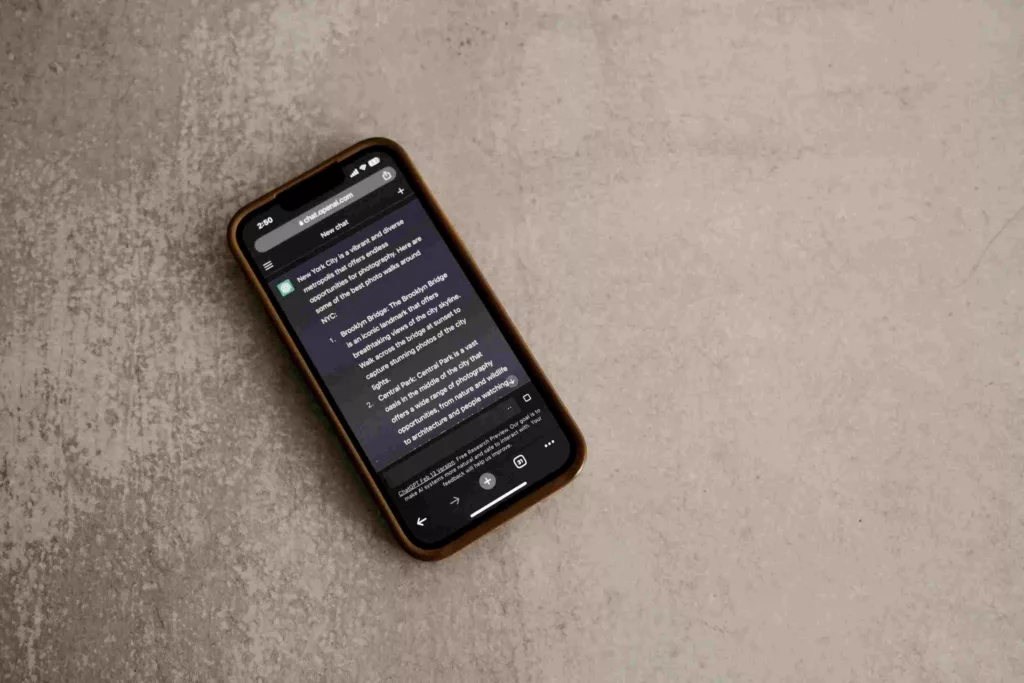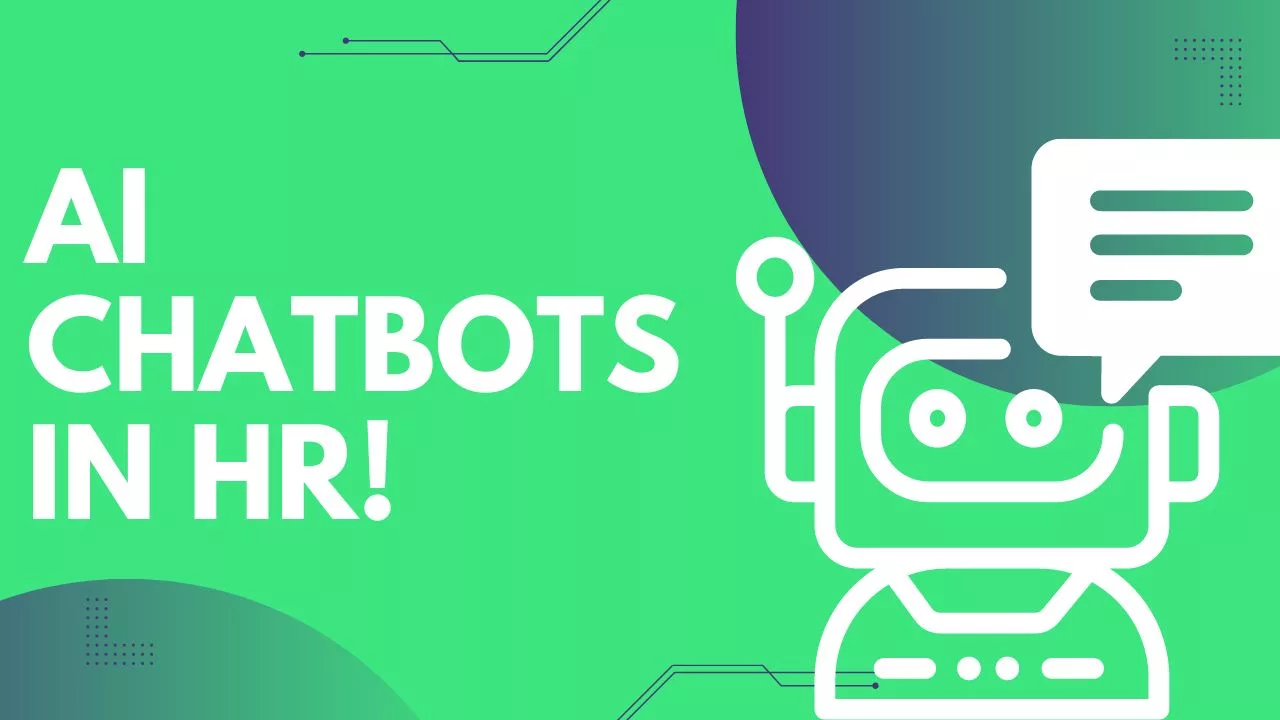In the ever-evolving world of HR, we’re constantly seeking innovative ways to enhance employee support and efficiency. One such innovation that’s making waves is the use of AI chatbots. They’re not just a buzzword, they’re transforming the HR landscape as we know it.
These intelligent virtual assistants are revolutionising how we handle HR tasks. From answering employee queries round-the-clock to automating repetitive tasks, they’re changing the game. But how exactly are they doing it? That’s what we’ll explore in this article.
For the same reason today HR aspirants are being taught about AI usage in renowned CIPD courses.
So, if you’re curious about how AI chatbots are reshaping HR, you’re in the right place. Following are the benefits, the challenges, and the future of AI chatbots.
- 24/7 Accessibility
- Quick Responses
- Efficient Onboarding
- Employee Self-Service
- Personalised Interactions
- Streamlining HR Processes
- Efficient Query Handling
- Tasks Automation
- Enhancing HR Efficiency and Employee Satisfaction
24/7 Accessibility
Unlike traditional HR services, AI chatbots offer 24/7 support to employees. With them in use, it’s as if the HR department never sleeps. Around-the-clock access to employee support is transforming the HR landscape dramatically. It’s important to unpack why this is so beneficial.
Firstly, consider shift workers or those in different time zones. With AI chatbots, they’re able to seek assistance at a time that suits their schedule. We’re no longer limiting support to traditional working hours of 9 to 5. This gives employees the flexibility and convenience they need to manage their work-life balance effectively.
Secondly, the always-ready nature of AI chatbots in HR means that responses are immediate. Gone are the days of waiting for hours, or even days, for a response to a query or issue. Quick responses help employees feel valued and heard, resulting in a positive workplace experience.
Lastly, repetitive questions such as those asking for leave or payroll information are easily managed by AI chatbots. Freeing up significant amounts of HR personnel time. Now, HR staff can focus more on strategic tasks that require a human touch.
AI chatbots consistently provide employees with a positive experience at any time, anywhere. The context might be different, but the message remains the same, support is always available.
Implementing AI chatbots in HR can present challenges. But when embraced effectively, they can pave the way to a future of increased productivity and employee satisfaction. This flexible, effective form of support is just one of the many benefits AI chatbots can bring to the HR industry.
Despite the potential hurdles, more and more HR departments worldwide are investing in these AI solutions to revolutionise their support systems. And so, we find ourselves witnessing a monumental shift towards AI-enhanced HR. This prompts us to ask more about these chatbots. What else can they do? What’s next for AI chatbots in HR?
Quick Responses
One of the defining benefits of using AI chatbots in HR is their capacity for quick responses. In a busy and dynamic workplace, time is of the essence and immediate feedback can make a huge difference.
Of course, the 24/7 Availability of these chatbots isn’t their sole strength; it’s the speed of responses that sets them apart. Through the aid of AI technology, chatting responses are generated instantly. Unlike human counterparts, who might take some time to respond, chatbots can provide answers almost immediately, making the communication process smoother, faster and highly efficient. This immediate action from the chatbots enhances employee support, makes employees feel valued and heard (no one likes to wait after all), and creates a better interactive environment.
Importantly, chatbots can handle multiple queries at the same time, which is a massive advantage in a large organisation where there is a constant influx of inquiries. There’s no doubt that AI chatbots bring efficiency to HR operations by reducing response times and handling multiple conversations concurrently, effectively ramping up productivity.
Another impressive feature of AI chatbots is their adaptability to a variety of queries. Their vast data processing capabilities mean they can provide instant responses to a wide range of issues or questions an employee might have, delivering customised solutions based on the specific query at hand. This kind of personalised and direct support contributes significantly towards improving employee satisfaction and making the employees feel heard.
By incorporating AI chatbots in HR, businesses effectively reduce the latency period of solving employee queries and streamline the overall problem-solving mechanism within the organisation. The improved immediacy in response serves to enhance employee experience and ensures an always-available HR support system, thereby freeing up HR personnel to focus on tasks of greater strategic value.
So, what does this all mean? Simply put, an AI chatbot’s speed, customisation ability, and multitasking capabilities are all crucial factors contributing to its effectiveness within HR operations. Together, they foster a more responsive, efficient, and supportive HR department, augmenting employee satisfaction and efficiency.
Efficient Onboarding
Another significant advantage of integrating AI chatbots in HR is the marked improvement in employee onboarding processes. For businesses, it’s a chance to make that critical first impression; it sets the tone for an employee’s tenure in the company. With AI chatbots in the mix, we’re able to make this process more interactive, personalised, and engaging.
By analysing employee data such as job roles, levels of expertise and personal preferences, AI chatbots can tailor the onboarding experience to each new hire. This custom approach helps new employees to understand their roles better, sets clear expectations, and paints a real picture of the company culture.
But how does this translate to numbers? Let’s consider an example: a typical onboarding process may take a few weeks to a month of back-and-forth emails, training, and orientation. But by using AI chatbots, companies have reported seeing this time decrease by approximately 30%. We’ve neatly summed up these key figures in the table below:
| Average Onboarding Duration | Decrease in Time with AI Chatbots |
| A few weeks to 1 month | Approx. 30% |
Didn’t we say it’s efficient? And we’re not just talking about the time, but also human resources involved within this operation. With AI chatbots taking care of frequently asked questions, HR personnel can focus on more value-added tasks.
Remember, the first touchpoint with the company leaves a lasting impression on any new hire. Providing them with this highly interactive, instant and customised onboarding experience helps to ease their transition into the company. By offering quicker solutions, providing immediate responses, and operating beyond regular working hours, AI chatbots are fundamentally redefining the onboarding process.
There’s more to AI chatbots in HR than just improving employee satisfaction and efficiency. It’s about stepping into an era where technology and human efforts coexist, fostering a healthy and efficient work environment. In the next part, we’ll shed light on another critical aspect where AI chatbots are creating a significant impact – employee training and development.
Also, Check Out: The Rise of AI in HR: Shaping the Future of Work
Employee Self-Service
AI chatbots in HR have reimagined what employee self-service looks like in today’s digital era. Gone are the days when we needed to fill in tedious paperwork or be on hold, waiting for the next available HR representative to problem-solve. Modern employee self-service now means real-time conversations with AI chatbots that can provide immediate assistance, 24/7.
AI chatbots are equipped with the capacity to carry out routine HR transactions, such as holiday booking or absence reporting, without human intervention. This boosts efficiency and reduces the administrative load on the HR team. Moreover, these bots provide an interactive platform for employees to seek reliable information, whether it’s the details of company policies, entitlements, and benefits, or the steps to take in case of a workplace issue.
A significant feature of AI chatbots is their ability to learn and adapt over time. As employees ask more questions and bots provide answers, their algorithm evolves, and their accuracy and helpfulness improve. They get better at understanding the unique needs and context of each employee, enhancing the overall user experience.
These chatbots have been instrumental in empowering employees to take charge of their HR needs. By providing freedom to users to manage their data, they centralise control and foster trust among employees. Let’s not forget they significantly cut down on time spent in lengthy communication chains with the HR department.
With all these in play, it’s evident that AI chatbots are revolutionising the dynamics of employee self-service. On the horizon lies even further advancements in both capabilities, and it’s exciting to imagine their potential. But before we delve too deep into prospects, let’s take stock and examine what impact AI chatbots have had on employee training and development.

Personalised Interactions
Empowering our HR teams with AI chatbots accelerates our transition to personalised HR interactions. Tailorable interactions are the next evolution in HR assistance. Instead of standardised responses that may not fully address an employee’s unique situation, AI chatbots can engage with employees in a more personalised manner.
These digital assistants can learn and adapt to the nuances of an employee’s queries by analysing their interaction history. They then use this information to provide a more customised response on subsequent interactions, nurturing smoother and more personalised relationships with employees.
We’re striving towards a realm where AI chatbots play a significant role in HR teams. They cater to the unique individual needs of the diverse workforce in an organisation, from answering simple questions concerning company policies to assisting with complex queries related to payslips, benefits, leave, and more.
The advantage of introducing AI chatbots into HR is how they make every interaction feel more human. They learn and mimic human conversational styles, reflecting our company’s tone and brand. They understand non-verbal communication cues, such as employee sentiment, to provide empathetic responses that would typically require a human touch and understanding.
Better still, AI chatbots can proactively anticipate the needs of workers by processing large sets of employee data and foresee trends or patterns. Armed with this data, they can pre-empt employee needs, check in on their well-being, and help HR even before the employees realise, they need it. This kind of intervention can lead to:
- Higher satisfaction rates
- Increased HR efficiency
- More engaged employees
AI chatbots are closing the gap between fast, efficient HR assistance and the tailored, empathetic approach we need from our HR teams. They’re transforming HR interactions into shared experiences between employees and their company. Fear no more, for the age of true personalised HR assistance with AI chatbots is here.
Streamlining HR Processes
As we delve deeper into the advantages of AI chatbots in HR, it becomes increasingly evident that AI chatbots are instrumental in streamlining HR processes. There’s no denying the value they offer in simplifying HR tasks, eliminating manual work, and increasing operational efficiency. Time is money as the adage goes – and in the HR world, this couldn’t ring truer.
One pivotal area where AI chatbots prove their merit is in recruitment. They can scan hundreds of resumes in mere minutes, analysing applicants’ skills, experiences, and educational backgrounds instantly. As a result, recruiters are freed from monotonous tasks and can dedicate more time to interviews and other high-value activities.
In the realm of employee benefits, AI chatbots are proving to be exceptional assistants. By serving as an immediate and reliable source of information, they save employees the hassle of reaching out to HR for queries on company policies, holiday entitlements, or other benefits-related questions. The chatbots also keep track of individual employees’ perks utilisation, shedding light on potential areas for improvement in benefits management.
AI chatbots are equally beneficial when it comes to data analysis. With access to the wealth of data gathered through various HR processes, these chatbots can conduct dynamic assessments, enabling the HR team to make informed decisions. For instance, they can analyse patterns in employees’ sick leave, identify trends, and allow HR managers to address any underlying issues proactively.
Let’s talk about training and development. With the capacity to deliver personalised learning experiences based on individuals’ strengths and weaknesses, AI chatbots elevate the effectiveness of training programmes. They allow HR to provide targeted training materials that bolster employees’ growth and enhance productivity.
Not only that, AI chatbots are also central to fostering a positive employee experience. By offering immediate responses and swift resolution of issues, they make the process of interacting with HR simpler and more efficient. This leads to satisfied employees who are more likely to stay engaged and committed to their roles.
Efficient Query Handling
The next major advantage of AI chatbots in HR: is their speed and efficiency in dealing with queries. Have we ever considered the amount of time our HR team spends on responding to simple questions or repeating the same instructions multiple times? It’s something that can easily be automated with AI chatbots, allowing our staff to concentrate on more strategic aspects of their roles.
AI chatbots can swiftly sift through extensive databases of information, hunting down precise answers in mere seconds. Their unparalleled speed when compared to human operators drastically reduces waiting times, keeping employee frustration at bay. These chatbots can effectively and efficiently handle a vast number of queries simultaneously without affecting their performance. This certainly enhances HR responsiveness and leads to a more streamlined workflow.
These chatbots do not merely provide rapid responses, they also deliver accurate solutions. By leveraging AI technology, these digital assistants gain the ability to learn from previous interactions, thereby minimising errors. As the chatbot learns, it can answer queries more accurately, subsequently reducing the instances of misguided or problematic advice.
Moreover, AI chatbots provide a more personalised experience. Through conversational interfaces, they can understand an employee’s preferences and use them to tailor their responses. This level of personalisation often leads to higher employee satisfaction and engagement.
The role of the AI chatbot’s inefficient query handling goes beyond simply answering questions. Over some time, they even anticipate common queries and pre-emptively provide important information, serving as proactive support for employees.
In short, AI chatbots have completely transformed the HR query handling process, wholly redefining speed, accuracy, personalisation, and proactive support that significantly aids in fostering a healthier and more efficient workspace. The next part of the article will focus on how AI chatbots simplify HR tasks and eliminate manual work, leading to a rise in operational efficiency.
Tasks Automation
Embracing the power of AI in HR, task automation has become a reality. It’s a trend we can no longer overlook. AI chatbots have a pivotal role in this transformation, facilitating tasks and cutting the cord on manual intervention.
AI chatbots revolutionise HR task automation by seamlessly integrating into our current systems. They simplify a slew of tasks ranging from analysing employee data to scheduling meetings. This automated support sustains a neater, more efficient work environment. What’s more, it frees up our HR professionals to focus on higher-value tasks such as strategic planning and employee engagement.
Consider the recruitment and hiring process. AI chatbots can screen and shortlist candidates, schedule interviews and send offer letters. On the employee engagement front, AI chatbots can collect and analyse feedback, identify patterns, and suggest areas of improvement. They handle administrative work like holiday requests and expense management with remarkable ease.
Employee training and development is another area primed for disruption. With AI chatbots in the mix, we can offer tailored learning materials, track progress, and provide immediate feedback. Personalising training materials to suit individual needs not only enhances the learning experience but also boosts overall engagement.
Our trusted AI chatbots are also an integral part of the employee benefits programme. They provide accurate and up-to-date information on benefits options, streamline enrolment processes, and field common queries.
The following table gives a snapshot of the key task areas where AI chatbots have been instrumental in HR automation:
| HR Task Areas | Automation Benefits |
| Employee Data Analysis | Reduces administrative load |
| Candidate Screening & Interview Scheduling | Improves speed and accuracy |
| Recruitment Processes | Streamlines selection and hiring |
| Employee Training & Development | Offers personalised experiences, tracks progress |
| Employee Benefits Programme | Streamlines enrolment, handles queries with accuracy |
All in all, AI chatbots in HR have revolutionised task automation, drove operational efficiency and added value to the HR and employee experience. And this, by no means, reflects the end of their potential. We’ll now further delve into how AI chat boards boost the overall HR responsiveness and efficacy in our next segment. Stay tuned.
Enhancing HR Efficiency and Employee Satisfaction
AI chatbots within the HR function are a game-changer. These powerful digital tools not only enhance HR effectiveness but also directly improve employee satisfaction. A smoother, more efficient HR process translates into a happier, more engaged workforce.
An often overlooked aspect is how a streamlined HR approach can boost overall operational productivity. Routines like leave applications, reimbursements, and benefits queries can eat up a lot of employee time. When these processes are automated through AI chatbots, employees can focus on core business tasks. It’s a practical, efficient way to manage HR-related issues with the least time investment from employees.
AI chatbots arm HR with the capacity to handle a more extensive range of tasks simultaneously. This multitasking ability increases HR productivity, freeing up staff to concentrate on strategic aspects, elevating the department’s profile within the company, and contributing more substantially to the bottom line.
Plus, AI chatbots offer a significant level of employee self-service. Staff can get answers to questions, process transactional requests, and receive personalised responses in real-time. This ease of access to key information empowers employees, making them feel more in control and positively impacting their satisfaction levels.
Lastly, the ability of AI chatbots to analyse and adapt to data boosts efficiency and satisfaction simultaneously. By processing employee feedback, they garner insights to continually refine and enhance HR processes. This continuous learning creates an HR function that’s not only more efficient but also more attuned to employee needs — a win-win situation.
Conclusion
We’ve seen how AI chatbots in HR are transforming the way we work. They’re not just about efficiency, but also about enhancing the employee experience. From onboarding to self-service, these bots are making HR more responsive and personalised. They’re freeing up HR professionals to focus on what matters, while also empowering employees to take control of their HR needs.
Furthermore, these bots are revolutionising task automation in HR, from data analysis to managing employee benefits. This not only streamlines processes but also improves operational efficiency, making HR a strategic partner in the organisation. The ability of AI chatbots to handle multiple tasks and provide proactive support is a game-changer, boosting productivity and satisfaction levels.
So, it’s clear that AI chatbots are more than just a tech trend. They’re a powerful tool that’s reshaping HR, making it more efficient, responsive and employee-centric. And as they continue to learn and adapt, we can only expect their impact to grow.
Check out Avado, the UK’s most trusted CIPD course provider today for HR and L&D courses:
CIPD Level 3 HR Courses: The CIPD Level 3 Certificate in People Practice is ideal for anyone looking to start a career in either HR or Learning and Development.
CIPD Level 5 HR Courses: The CIPD Level 5 Associate Diploma in People Management will help you build on your existing HR knowledge.
CIPD Level 5 L&D Courses: The CIPD Level 5 Diploma in Organisational Learning and Development is the most comprehensive course available for L&D professionals, ideal for you if you want to formalise your existing experience, skills and knowledge.
CIPD Level 7 HR Courses: The CIPD Level 7 Advanced Diploma is aimed at expanding learners’ autonomy so they can strategically direct organisations and their people.
 17 min read
17 min read 



